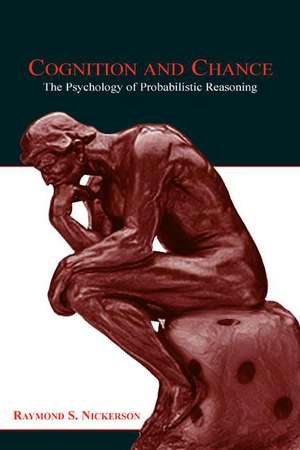Cognition and Chance: The Psychology of Probabilistic Reasoning
Autor Raymond S. Nickersonen Limba Engleză Hardback – 30 apr 2004
Cognition and Chance is intended to appeal to researchers and students in the areas of probability, statistics, psychology, business, economics, decision theory, and social dilemmas.
Preț: 964.59 lei
Preț vechi: 1176.34 lei
-18% Nou
Puncte Express: 1447
Preț estimativ în valută:
184.57€ • 193.23$ • 152.72£
184.57€ • 193.23$ • 152.72£
Carte tipărită la comandă
Livrare economică 07-21 aprilie
Preluare comenzi: 021 569.72.76
Specificații
ISBN-13: 9780805848984
ISBN-10: 0805848983
Pagini: 472
Dimensiuni: 164 x 237 x 35 mm
Greutate: 0.99 kg
Ediția:New.
Editura: Psychology Press
ISBN-10: 0805848983
Pagini: 472
Dimensiuni: 164 x 237 x 35 mm
Greutate: 0.99 kg
Ediția:New.
Editura: Psychology Press
Cuprins
Contents: Foreword. Probability and Chance. Randomness. Coincidences. Inverse Probability. Some Instructive Problems. Paradoxes and Dilemmas. Statistics. Estimation and Prediction. Perception of Covariation. Choice Under Uncertainty. People as Intuitive Probabilists. Concluding Comments.
